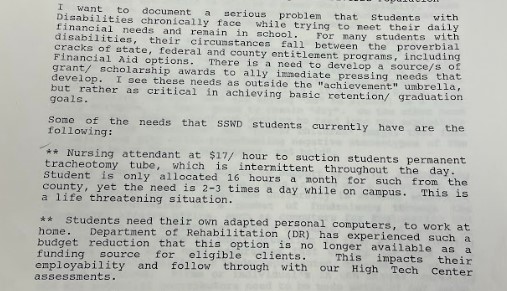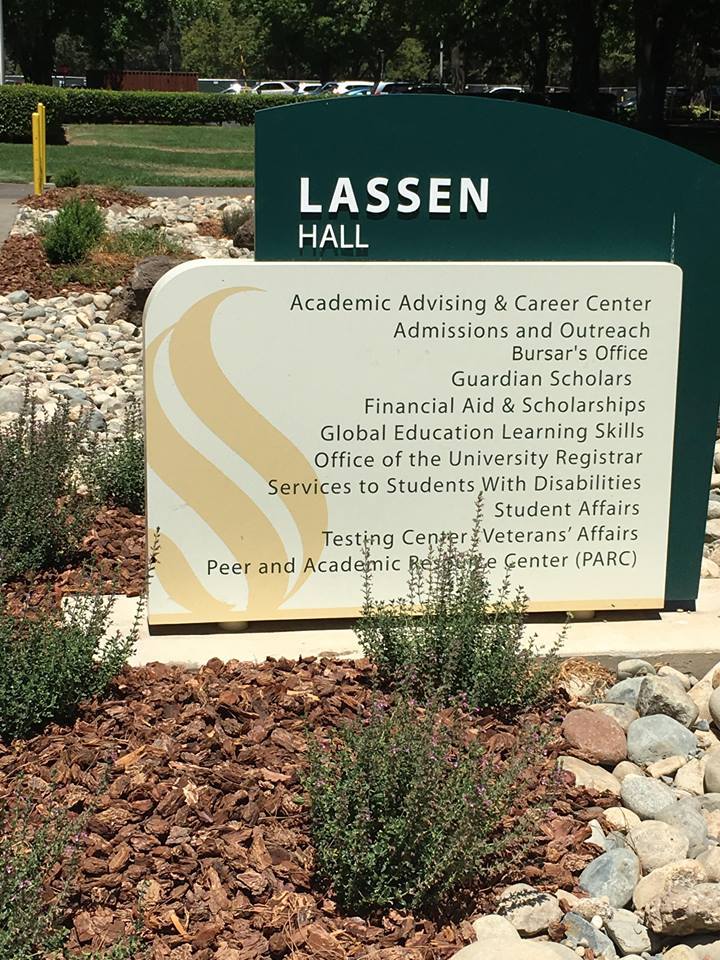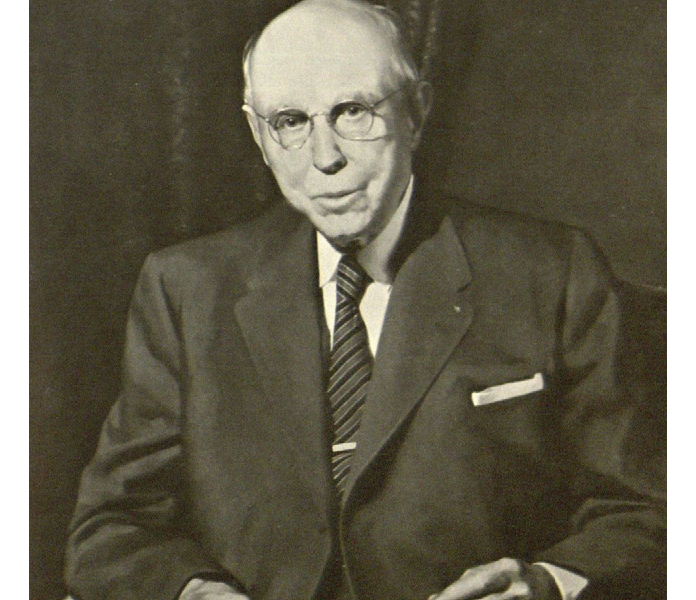Thousands of disabled students across the CSU system know just how frustrating it can be to get the accommodations you need. University departments for providing services to disabled students are often understaffed and underfunded, and therefore frequently have difficulty actually getting students the accommodations that are required under the ADA.
But what did students do before the Americans with Disabilities Act (signed in 1990) existed?
The answer: disabled activists, and their allies, fought the same exhausting battles ceaselessly over decades. (And the fight isn’t done, unfortunately.)
When it comes to CSUS in particular, many of those battles were fought by one woman in particular: Patricia Sonntag (1943-2006), who was director of Services to Students with Disabilities (SSWD) for 31 years.
Patricia Sonntag spent three decades leading an underfunded and overburdened department, doing the best with what she had – which was a fraction of what she, and the disabled students, needed.
Here is an excerpt from a letter she sent to the Dean of Student Affairs in 1989:

[Image ID: text that reads “I want to document a serious problem that Students with Disabilities chronically face while trying to meet their daily financial needs and remain in school. For many students with disabilities, their circumstances fall between the proverbial cracks of state, federal and county entitlement programs, including Financial Aid options. There is a need to develop a source/s of grant/scholarship awards to ally immediate pressing needs that develop. I see these needs as outside the ‘achievement’ umbrella, but rather as critical in achieving basic retention/graduation goals.
Some of the needs that SSWD students currently have are the following:
Nursing attendant at $17/hour to suction students permanent tracheotomy tube, which is intermittent throughout the day. Student is only allocated 16 hours a month for such from the county, yet the need is 2-3 times a day while on campus. This is a life threatening situation.
Students need their own adapted personal computers, to work at home. Department of Rehabilitation (DR) has experienced such a budget reduction that this option is no longer available as a funding source for eligible clients. This impacts their employability and follow through with our High Tech Center assessments.” End Image ID]
The letter includes another page of bullet points giving examples of accommodation needs that were not met. She notes that the needs of students are nowhere near covered, including life-threatening accommodations.
Sonntag showed a deep understanding of ableism and how it affected students. In the same letter, she discusses potential funding options:

[Image ID: text that reads “The examples listed are outside of the scope of our state funded SSWD program. Because of the nature of needs that I have listed above, I am reluctant to recommend pursuit of a ‘true grit’ type of award structure, which is achievement oriented. Many students face enormous barriers daily in simply getting from the bus to the classroom, while avoiding the bicyclists, if they are blind. For some, passing the Pub/Nest and saying ‘No’ to alcohol is a giant daily struggle, in their quest to remain ‘dry.’ On the other hand students are adamant about not wanting to feed into the exploitative nature of the ‘telethons’ and ‘poster children’ images that feed on guilt and pity while perpetuating negative stereotypes of the disabled being ‘brave, courageous, and bold.'” End Image ID]
She knew well that the “miracle,” “champion,” and “perseverance” narratives glorifying disability would not help students. She wanted accommodations for all students, not just the thin slice of the population that can fit into the narrow definitions of “achievement.”
Sonntag entered onto this battleground in the 1970s, when many of the current legal protections for disability did not exist. However, there’s not as much difference between then and now as you might think.
In an article in the State Hornet published February 6, 2001, Sonntag’s words draw attention to the fact that even years after the ADA was signed, CSUS could not cover all the needs of their students, particularly accommodations for disabilities.
Despite a compliance deadline set for 1995, the school has still not met the requirements that the ADA imposed back in 1992, according to Patricia Sonntag, director of Services to Students with Disabilities.
“We’ve got problems all over campus. Every single building has something wrong with it,” Sonntag said.
Achieving equity is a monumental task, and of course Sonntag couldn’t accomplish it all during her time as Director. But signs of her work are all over campus, physically or abstractly.
Sonntag contributed to several Budget Change Proposals to fund programs for disabled students across all CSU campuses. She was particularly dedicated to ensuring computer access and adaptive technology for students with disabilities. She lobbied for barrier removal, better signage, and accessible rooms.
Patricia Sonntag passed away in 2006. A public memorial for her was held on campus a few months later. She is remembered for being a passionate advocate for disability rights, especially accessibility, health services, and political rights.
The battle isn’t done. But Patricia Sonntag knew that she couldn’t abandon the cause, even if she would never see it finished.
So every time you see a parking spot with a disability symbol, hear an automated voice tell you which floor the elevator stopped on, or use a voice-to-text program, know that these are only here because thousands of people–people like Patricia Sonntag–dedicated their lives to fighting for the right for people with disabilities to exist in public spaces. The fight for rights for people with disabilities began long before Patricia Sonntag was born and has continued well after she passed away, but it’s people like her that make this campaign possible.
Learn More:
-Request accommodations now:
https://www.csus.edu/student-affairs/centers-programs/services-students-disabilities/
-Comedian and journalist Stella Young takes the stage to explain why “inspiration porn” of disabled people is so annoying:
-State Hornet article regarding inadequate access in 2001:
Campus under scrutiny for inadequate access
-State Hornet article regarding Patricia Sonntag’s memorial:
Family, friends remember former director of SSWD
-More information about the work of Patricia Sonntag and the history of SSWD can be found in the Donald & Beverly Gerth Special Collections & University Archives. Pictures in this article are from: Patricia M. Sonntag to George Wayne, 20 September 1989, Record Group 89, Container 24, Folder 4, Office of Student Affairs, Donald & Beverly Gerth Special Collections & University Archives, California State University, Sacramento, Sacramento, CA.



This is a very interesting article. As a student with a disability myself, it is particularly interesting to me.
I think that this is important to keep talking about. Thanks to the people like Patricia Sonntag, there was an improvement to the education system. And it still is not perfect. She is an inspiration.
This is something not discussed often enough at Sac State. There is much left to reform but I am so grateful to people like Patricia Sonntag for working so hard to make this campus a more accessible place. Ableism is a topic many need to be educated on. I find it admirable that she not only pointed out issues on campus, but also identified solutions and how to fund them.